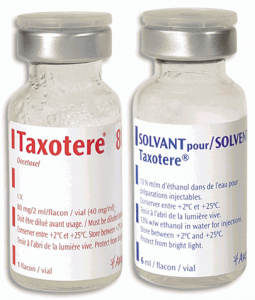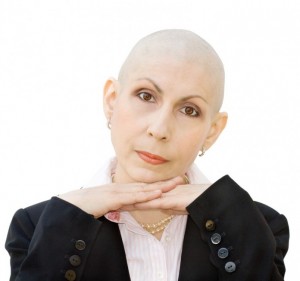Side Effects and Symptoms of Taxotere
Permanent Hair Loss and More
Request Your Free Case Evaluation
People prescribed docetaxel (brand names Taxotere and Docefrez) can experience edema (fluid retention under the skin), infection, throat and mouth sores (stomatitis), congestion, constipation, anorexia, peeling of the skin (desquamation), and changes in the way things taste. Medication is often prescribed to individuals who experience extreme nausea and vomiting as a result of taking this drug. Some people find that consuming smaller meals, not eating prior to treatment, and restricting physical activity can help alleviate these gastrointestinal symptoms. Additionally, women may find that their periods have temporarily or permanently stopped after being treated with Docefrez. Alopecia (hair loss) and changes in color and thinning of nails can also occur and are permanent for some. Many individuals feel that they were not sufficiently warned of this side effect and that they should have been offered alternative medications that are not known to cause permanent hair loss. For this reason, some patients are seeking legal counsel.
It can cause the following serious adverse reactions:
- changes in sight (such as blurry or worsened vision and seeing flashes of light)

- muscle, bone, and joint pain, neuropathy (numbness, tingling, burning in fingers, hands, arms, legs, feet, or toes)
- irregular heartbeat
- weight gain
- extreme fatigue/weakness
- eye pain
- swollen face, hands, fingers, stomach, lower legs, or feet
Medical assistance is necessary if you experience a severe allergic reaction to this drug. Signs of anaphylaxis include:
- difficulty breathing
- rash
- swelling/itching of the tongue, face, and throat
- profound dizziness
Docefrez can also cause dangerously low red and white blood cell count disorders (anemia, leukopenia, and neutropenia) as well as thrombocytopenia – a platelet deficiency that results in bruising, bleeding, and blood clotting if an injury is sustained. Peripheral nerve damage that feels like “pins and needles” and dysesthesia – a nerve disorder where burning, itching, and pain can result from touching the body, but can also occur without contact – have also been reported.
This medication can cause an increase in aspartate aminotransferase (AST) and alanine aminotransferase (ALT) – enzymes found in the blood. ALT is mostly concentrated in the liver and to a much lesser degree is found in the heart, pancreas, kidneys, red blood cells, skeletal muscles, and brain. AST is also in the pancreas, heart, red blood cells, and kidneys. Proper levels of both are necessary for healthy organ functioning.
What About Other Chemotherapy Drugs?
There are various types of medications that work in different ways. Many have overlapping side effects – including injection site pain. Although common reactions are listed, not everyone reacts the same way to cancer treatment so be cautious when reading material.
Cisplatin (brand name Platinol-AQ) – another common chemotherapy drug – also has some very serious side effects. These include blood in feces and urine, pain in the side or lower back, wheezing, difficult or painful urination, hair loss, fever and chills, swelling of the face, rapid heartbeat, and abnormal bleeding and bruising. Additional reactions are white blood cell deficiency, difficulty hearing (including ringing in the ears), issues with balance, red spots on skin, anemia, kidney disease, fatigue, magnesium deficiency, loss of appetite, joint pain, and swelling in the lower legs or feet. Trouble walking, numbness/tingling in toes or fingers, seizures, inability to taste, mouth sores, loss of reflexes, hives, cough, blurry vision, anaphylaxis, nausea/vomiting, and damage to the spinal cord and brain have also been experienced by patients.

Like Platonol-AQ, carboplatin (brand names Paraplatin and Paraplatin-AQ) can also cause blood in urine or stools, fever and chills, pain and difficulty when urinating, nausea, vomiting, tingling/numbness in fingers or toes, appetite loss, blurred vision, ear ringing, loss of energy, red spots on skin, wheezing, irregular bleeding and bruising, hair loss, and lower back and side pain. Taking it also may result in hypersensitive reaction, itching, skin rash, constipation, and diarrhea. Carboplatin was voluntarily recalled nationwide in 2015 as a result of contamination from foreign particles. Gemcitabine (brand name Gemzar) is another treatment that was recalled during that year because foreign particle matter was discovered in solutions. This type of contamination can cause stoke, respiratory failure, heart attack, liver failure, kidney failure, and severe allergic reactions.
Although temporary hair loss is stated as a side effect of Cytoxan (generic name cyclophosphamide) – another common chemotherapy drug – there are many documented cases of permanent alopecia. It can also cause serious nausea and vomiting, headache, diarrhea, stomach pain, and changes in hair color and texture. Severe side effects of this drug include joint pain, agitation, confusion, flu-like symptoms (fever, chills), blood in urine, trouble breathing, fatigue, jaundice (yellowing of the skin and eyes), pain in lower back and side, excessive thirst, urinating more than usual, swelling in the lower legs and feet, cough/hoarseness, and irritation at the injection site (swelling, redness, pain).
Other chemotherapy drugs that are likely to cause hair loss are:
- Epirubicin (Ellence)
- Cyclophosphamide (Neosar)
- Dactinomycin (Cosmegen)
- Paclitaxel (Abraxane, Taxol, Onxol, Nov-Onxo)
- Altretamine (Hexalen)
- Vincristine (Marqibo, Vincasar)
- Doxorubicin (Adriamycin, Doxil)
- Ifosfamide (Ifex)
- Vinorelbine (Alocrest, Navelbine)
- Idarubicin (Idamycin)
Targeted therapies do not cause total hair loss but some individuals experience thinning hair or changes in texture (such as hair that is more dry or curly than before). These medications include:
- cetuximab (Erbitux)
- vemurafenib (Zelboraf)
- panitumumab (Vectibix)
- sorafenib (Nexavar)
- erlotinib (Tarceva)
It is always wise to do some research before starting any form of treatment so that you are aware of the risks involved. Most people have side effects from chemotherapy – once treatment is completed these symptoms are supposed to disappear. However, this is not always the case and patients are not always adequately warned of these risks.
Sources
- http://www.breastcancer.org/treatment/druglist/taxotere
- http://www.pcf.org/site/c.leJRIROrEpH/b.5836637/k.D89F/Side_Effects_of_Chemotherapy.htm
- http://www.webmd.com/drugs/2/drug-8756/cisplatin-intravenous/details/list-sideeffects
- http://www.mayoclinic.org/drugs-supplements/carboplatin-intravenous-route/side-effects/drg-20062578
- http://www.drugs.com/sfx/cytoxan-side-effects.html
- http://www.fda.gov/Safety/Recalls/ucm444498.htm
- http://www.cancer.net/navigating-cancer-care/side-effects/hair-loss-or-alopecia

Barbara Dunning
I Barbara Dunning was on Faslodex Fulvestrant Injection which cause me serious Urinary Tract Infection and hard to get rid of I have been on so many infection medications Doxycycline Hyclate 100mg, Cephalexin 500mg, Metronidazole 500mg ,Ciprofloxacin 500mg ,Sulfameth /TMP 800/160MG Only one that was helping me and Insurance Stop Paying For It Then there was a finding with Diverticulitis in the Sigmoid Colon Region ,There Is now Air noted in region of vaginal Cuff and also within the Urinary Bladder suggesting a Fistula between the Colon and the Urinary Bladder .Painful to Urinate have Spasms FASLODEX Fulvestrant Injection Caused This Urinary Tract Infection Disease. I have been on URIBEL, Myrbetriq, NOW I HAVE BEEN TOLD I WILL NEED AN COLONOSCOPY I HAVE HAD IT .And Waiting For my Results Sufferring*****..painful to urinate***,, Also I was on ENJUVIA CONJUGATED ESTROGEN TYPE OF HORMONE REPLACEMENT THERAPY That Is Suppose to Relieve Symptoms of Menopause, Vaginal Dryness Replacing Estrogen for Ovaries that no longer produce. I was diagnosed with BREAST CANCER THAT ENJUVIA CAUSED I Have been suffering with Cancer Treatments have many bad side affects dry mouth, skin, eyes, JOINT PAIN, SORES IN MOUTH, ULCERS, PAINFUL TO EAT, Have to D-JUICE ALL MY FOOD ,Inability to Chew doctor said. Keep infections, inflammation, Caused by Chemo, and FASLODEX, Have been on AFINTOR, ARIMIDEX, ANASTROZOLE,ARIMIDEX, TOMOXIFEN,AROMATASE,EXEMESTANE ALL Of Them Caused my hair to thin out, nausea, hot flashes badly, vomit, loss of appetite, sever stomach pain, abdominal pain, sweat, tingling, numbnes, burning in back, Anxiety Insomnia, constipation, diareer, vaginal dryness, dizziness, muscle pain, bone pain, dry mouth ,moody, headaches, Nerve pain, Have a Tooth ache everyday all night long Nerve pain in mouth caused by these cancer treatments and infections It Never Goes Away SUFFERRING.ENJUVIA CONJUGATED ESTROGENS CAUSED MY HAVING TO HAVE CANCER TREATMENT LUMP IN RIGHT BREAST CAUSED BY ENJUVIA Been Battling Cancer Since 2011 TERMINAL STAGE 4 CANCER CAUSED BY ENJUVIA CONJUGATED ESTROGENS HORMONE REPLACEMENT THERAPY Medications are causing me more and more permanent health problems Suffering** chemo and radiation Radiation my System almost shut down could not use restroom dehydrated had to go to hospital stomach motion sickness severe stomach pain throwing up, weak,weak, dizzy, lightheadness, Sufferring CANCER PATIENT TERMINAL STAGE 4 BREAST CANCER ENJUVIA CASUED THIS, CANCER SPREADED TO MY BONES.SUFFERRING CANCER PATIENT BARBARA DUNNING BAD MEDICATIONS.*
·